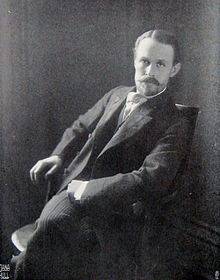Burton Holmes
This article's tone or style may not reflect the encyclopedic tone used on Wikipedia. (January 2024) |
Burton Holmes | |
|---|---|
 Holmes, c. 1905 | |
| Born | Elias Burton Holmes January 8, 1870 |
| Died | July 22, 1958 (aged 88) Los Angeles, California, U.S. |
| Nationality | American |
| Occupation | Travel lecturer |
| Known for | Travelogues |


Elias Burton Holmes (January 8, 1870 – July 22, 1958) was an American traveler, photographer and filmmaker, who coined the term "travelogue". Travel stories, slide shows, and motion pictures were all in existence before Holmes began his career, as was the profession of travel lecturer; but Holmes was the first person to put all of these elements together into documentary travel lectures.[citation needed] He recorded the earliest known footage of Japan and Korea, in 1899.
Early years
Elias Burton Holmes was born into a middle-class Chicago family, the son of a banker. His interest in travel was sparked at the age of nine when his grandmother took him to hear a then-famous travel lecturer,
In 1890, Holmes accompanied his grandmother on a trip to Europe and when he returned showed slides of his trip at the Chicago Camera Club, of which he was a member. Holmes wrote of this event: "To take the edge off the silence, to keep the show moving, I wrote an account of my journey and read it, as the stereopticon man changed slides."[1]
Despite the success of this event, which grossed $350 for the club, it was not until several years later that Holmes decided to set himself up as a travel lecturer. In 1893, after sending out 2,000 invitations to a select group of Chicagoans, Holmes gave two sold-out talks about a recent trip to Japan.[citation needed]
Travelogues
Initially Holmes had only modest success as a travel lecturer. Then in 1897, John L. Stoddard retired, creating something of a vacuum in the field. Around the same time, Holmes began to supplement his hand-colored glass slides with the then excitingly new technology of moving pictures. As the years went on, film came increasingly to dominate his lectures.[2]
In the years that followed, Holmes traveled extensively: North and South America, Europe, Russia, India, Ethiopia, Burma (now Myanmar). He lectured about such topics as the Panama Canal, the "Frivolities of Paris," even the adventures of
Holmes's talks—which totaled over 8,000 by the end of his life—drew their largest audiences in cosmopolitan cities like New York, Boston, and Philadelphia. He catered especially to the armchair traveler with escapist fantasies, and for this reason he consciously focused his lectures on the most agreeable and scenic aspects of the places he lectured about. He avoided all discussion of politics, poverty, and other social ills.[4]
Personal life
In 1914, Holmes married Margaret Oliver, whom he had met on one of his expeditions. They lived primarily at an estate called "Topside" in the Hollywood Hills that was a former riding club. Holmes also had a duplex, "Nirvana", in New York that was packed with treasures from Southeast Asia; this he eventually sold to Robert Ripley.[5]
Legacy
Burton Holmes has a star on the
See also
- Lyman Hakes Howe
References
- ^ a b Wallace, Irving. "Everybody's Rover Boy". In The Sunday Gentleman, New York: Simon & Schuster, 1965, p. 115.
- ^ "Burton Holmes, Extraordinary Traveler" website, "Hand-Painted Colored Slides" page.
- ^ https://www.koreatimes.co.kr/pages/article.asp?newsIdx=332093
- ^ Wallace, Irving. "Everybody's Rover Boy". In The Sunday Gentleman, New York: Simon & Schuster, 1965, p. 113.
- ^ "Burton Holmes, Extraordinary Traveler", burtonholmes.org; accessed March 2, 2018.
Bibliography
- Works by Holmes
- The Burton Holmes Lectures, Battle Creek, Michigan: Little-Preston, 1901,
- The Traveler's Russia. G.P. Putnam's Sons, 1934.
- The World Is Mine. Culver City, California: Murray & Gee, 1953.
- Holmes, Burton (1920). The Olympian Games in Athens, 1896: The First Modern Olympics. Grove/Atlantic, Incorporated. ISBN 978-0-394-62115-9.
- Works about Holmes
- Holmes, Burton; Taschen, Benedikt; Caldwell, Genoa (2006). Burton Holmes Travelogues: The Greatest Traveler of His Time, 1892-1952. ISBN 978-3-8228-4815-9.
- Caldwell, Genoa (1977). The Man who Photographed the World: Burton Holmes, Travelogues. H.N. Abrams. ISBN 9780810910591.
- Roan, Jeanette (2010). ""To travel is to possess the world": The Illustrated Travel Lectures of E. Burton Holmes". Envisioning Asia: On Location, Travel, and the Cinematic Geography of U.S. Orientalism. Project MUSE.
- Soule, Thayer (2003). On the Road with Travelogues: 1935-1995 a Sixty-Year Romp. 1st Books Library. ISBN 978-1-4107-9971-5.
- Wallace, Irving. "Everybody's Rover Boy." In The Sunday Gentleman. New York: Simon & Schuster, 1965.
- Stockham, Ed. "Burton Holmes", song, 2015.
